

Heuer Hacking Human Language PyCon. Docker Hub - Content, Collaboration, Workflows, and More. Testinfra test your infrastructure — testinfra Installed /var/build/user_builds/testinfra/checkouts/latest/.eggs/pbr-0.11.0-py2.7.egg [pbr] Generating ChangeLog 1.0.0.0a3.dev7 documentation. Latest documentation: About With Testinfra you can write unit tests in Python to test actual state of your servers configured by managements tools like Salt, Ansible, Puppet, Chef and so on.
![Testinfra test your infrastructure — testinfra Installed /var/build/user_builds/testinfra/checkouts/latest/.eggs/pbr-0.11.0-py2.7.egg [pbr] Generating ChangeLog 1.0.0.0a3.dev7 documentation](http://cdn.pearltrees.com/s/pic/th/infrastructure-documentation-107878667)
Testinfra aims to be a ServerSpec equivalent in python and is written as a plugin to the powerfull Pytest test engine Warning Testinfra is currently alpha software, API may change before the first release, and OS support is limited. Quick start Install testinfra using pip: pip install --pre testinfra # or install the devel version pip install 'git+ Write your first tests to test_myinfra.py: The Twelve-Factor App.
The Hitchhiker’s Guide to Python! Greetings, Earthling!

Welcome to The Hitchhiker’s Guide to Python. This is a living, breathing guide. If you’d like to contribute, fork us on GitHub! This handcrafted guide exists to provide both novice and expert Python developers a best practice handbook to the installation, configuration, and usage of Python on a daily basis. This guide is opinionated in a way that is almost, but not quite, entirely unlike Python’s official documentation. Let’s get started! Getting Started with Python New to Python? Properly Install Python Writing Great Python Code This part of the guide focuses on the best-practices for writing Python code. Docopt—language for description of command-line interfaces.
Packaging Your Code. If you’re writing an open source Python module, PyPI , more properly known as The Cheeseshop, is the place to host it.
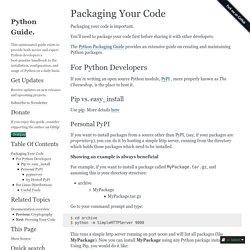
Personal PyPI If you want to install packages from a source other than PyPI, (say, if your packages are proprietary), you can do it by hosting a simple http server, running from the directory which holds those packages which need to be installed. Showing an example is always beneficial. Installing Python on Mac OS X. The latest version of Mac OS X, El Capitan, comes with Python 2.7 out of the box.

You do not need to install or configure anything else to use Python. Having said that, I would strongly recommend that you install the tools and libraries described in the next section before you start building Python applications for real-world use. Fake-factory 0.5.0. Faker is a Python package that generates fake data for you.
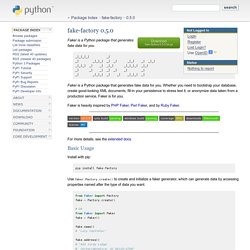
Faker is a Python package that generates fake data for you. Whether you need to bootstrap your database, create good-looking XML documents, fill-in your persistence to stress test it, or anonymize data taken from a production service, Faker is for you. Faker is heavily inspired by PHP Faker, Perl Faker, and by Ruby Faker. For more details, see the extended docs. Basic Usage. System för säker fastighetsövervakning. Quickstart — pypuppetdb 0.1.0 documentation. Once you have pypuppetdb installed you can configure it to connect to PuppetDB and take it from there.
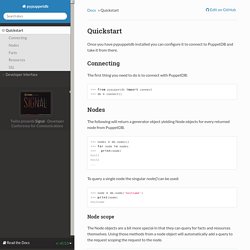
Connecting¶ The first thing you need to do is to connect with PuppetDB: >>> from pypuppetdb import connect>>> db = connect() Nodes¶ The following will return a generator object yielding Node objects for every returned node from PuppetDB. >>> nodes = db.nodes()>>> for node in nodes:>>> print(node)host1host2... To query a single node the singular node() can be used: >>> node = db.node('hostname')>>> print(node)hostname Node scope¶ The Node objects are a bit more special in that they can query for facts and resources themselves. Click — click. Norbert Wiener. Norbert Wiener (November 26, 1894 – March 18, 1964) was an American mathematician and philosopher.
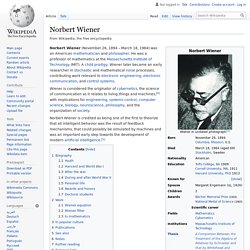
He was Professor of Mathematics at MIT. A famous child prodigy, Wiener later became an early researcher in stochastic and noise processes, contributing work relevant to electronic engineering, electronic communication, and control systems. Wiener is considered the originator of cybernetics, a formalization of the notion of feedback, with implications for engineering, systems control, computer science, biology, neuroscience, philosophy, and the organization of society. Biography[edit] Youth[edit] Wiener was born in Columbia, Missouri, the first child of Leo Wiener and Bertha Kahn, Jews[1] of Polish and German origin, respectively.
Despite being raised in a Jewish family, he later became an agnostic.[2] After graduating from Ayer High School in 1906 at 11 years of age, Wiener entered Tufts College. Harvard and World War I[edit] After the war[edit] During and after World War II[edit] Keen IO - Analytics for Developers. Kate Heddleston. Plotly. Bongos, It's not the end of the internet. CyCy — Building an Interpreter With RPython 0.1.0 documentation. It certainly does not interpret an appreciable amount of C, nor does it run particularly quickly, but it’s a small step beyond the example interpreter (which we’ll also see soon).
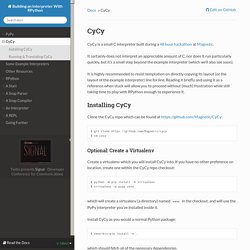
It is highly recommended to resist temptation on directly copying its layout (or the layout of the example interpreter) line for line. Reading it briefly and using it as a reference when stuck will allow you to proceed without (much) frustration while still taking time to play with RPython enough to experience it. Installing CyCy¶ Clone the CyCy repo which can be found at $ git clone $ cd cycy Optional: Create a Virtualenv¶ Create a virtualenv which you will install CyCy into. . $ python -m pip install -U virtualenv $ virtualenv -p pypy venv which will create a virtualenv (a directory) named venv in the checkout, and will use the PyPy interpreter you’ve installed inside it.
Install CyCy as you would a normal Python package: $ venv/bin/pip install -e . which should fetch all of the necessary dependencies. Note But!